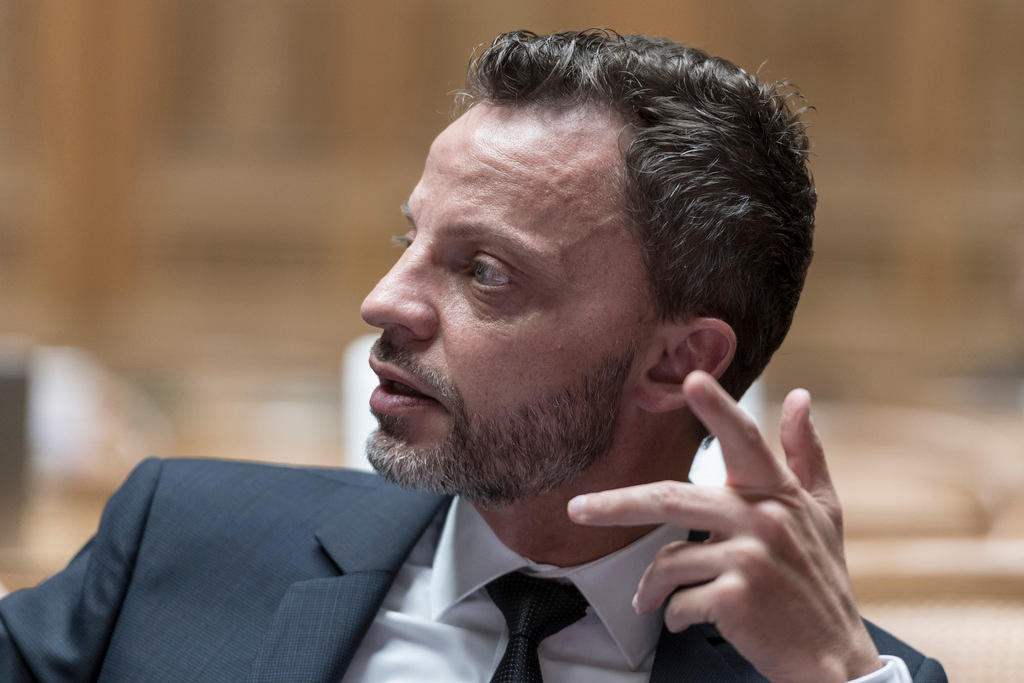‘Foreign judges’ initiative: fact checking the parliamentary debates

As the Swiss parliament gets set for a final debate on an initiative aimed at giving domestic law precedence over international law, swissinfo.ch checks the accuracy of some of the statements heard so far in both chambers.
The initiative “Swiss law instead of foreign judges”, backed by the conservative right Swiss People’s PartyExternal link, proposes making the Swiss constitution the country’s primary legal source. The initiative would prevent Switzerland from entering into international obligations that contradict the constitution. Where such conflicts exist, the country would have to change or terminate agreements, although treaties that have been subject to a national referendum would continue to be applied by the courts.

“We are not under the thumb of international law. We can terminate a treaty that we entered into at any time […] Switzerland can cancel any contract at any time. If we wanted to, we could even terminate the European Human Rights Convention tomorrow. We just need to meet the notice period.” Pirmin Bischof, Christian Democrats
Context:
The key objective of the self-determination initiative is to put Swiss law before international law. This comes in response to a supreme court ruling that international law should take precedence over national law, even though this is not enshrined in Swiss law.
True or false?
Senator Bischof’s argument that any international treaty could be terminated at any time was so convincing that several other parliamentarians have since repeated his statement.

There’s a catch, however. In such absolute terms, Bischof’s claim is not accurate. Some international treaties simply cannot be terminated.
Although quite rare, they do existExternal link. Above all, there are the UN pacts on economic, social and cultural rights, or more precisely on civil and political rightsExternal link. The catalogue of human rights included in these pacts is similar to the one enshrined in the European Convention on Human Rights (ECHR).
The border treaties between Switzerland and neighbouring countries also cannot be terminated, and neither can mandatory international law.
The ECHR, on the other hand, can be terminated. Bischof was right in this respect. Switzerland would only have to respect a notice period of six months imposed by the ECHR. Most other treaties signed with other countries also contain cancellation clauses.

“No other country in the world assumes that international law takes precedence over their country’s constitution.” Hans-Ueli Vogt, Swiss People’s Party
Context: The People’s Party uses the comparison between Switzerland and other countries to support its argument that the initiative would simply implement what was already in place elsewhere. But opponents argue that such comparisons are short-sighted and misleading.
True or false?

The Federal Office for Justice commissioned a report to establish how other states manage the relationship between international and national law. None of the countries studied was found to subscribe to the idea of “mechanically” giving international law precedence. In this respect, Vogt is right.
But there is one exception. EU law takes precedence over national law in member states. Kurt Fluri of the Radical-Liberals argues: “All EU member states have to comply with EU law, even if they were to rule differently under their national laws.” This is trueExternal link. However, EU law is a special case, as the EU is a union of states, or a hybrid between a state and a confederation of states. The more such a union resembles a state, the less sovereignty the individual countries have. This is very similar to Switzerland’s federal system, whereby federal law takes priority over cantonal law.

“Thanks to the ECHR and the pressure it imposed, voting rights for women were introduced, asbestos victims were compensated, and administrative detention was abolished, for example.” Nadine Masshardt, Social Democratic Party
Context: Opponents have repeatedly drawn attention to the importance of the ECHR for Switzerland, believing that if the initiative were adopted, the country would have to abandon the human rights treaty.
Voting Rights for Women
Switzerland was one of the last countries in western Europe to ratify the ECHR, as some aspects of the Swiss Constitution were not in line with human rights. The fact that only men had the right to vote was one of them, since it violated the ban on discrimination.
In 1968, the Federal Council envisaged signing the ECHR but required a special provision regarding voting rights for women. Women’s associations were up in arms. In an effort to appease them, the government launched an initiative for women’s suffrage, which was accepted by national vote in 1971. The ECHR was finally signed in 1974.

Asbestos victims
Compensation claims for bodily harm and death in Switzerland become null and void after ten years. Since the health effects triggered by asbestos are often only diagnosed years or even decades after exposure, the comparatively short period for requesting compensation is problematic. One victim suffering from asbestos-related injury took his case to the European Court of Human Rights, which ruledExternal link that in view of the severe damage to the victim’s health, the 10-year-limitation was disproportionate. After several tough debates, the Swiss parliament agreed to extend the limitation period to 20 years.
Administrative detention
Until the 1980s, Swiss authorities did not only lock away criminalsExternal link but also detained men and women whose lifestyles were considered immoral by the day’s standards: single mothers, prostitutes, alcoholics, drug addicts and others. With no right of appeal, these groups were unable to fight their detention.
Only after the ECHR was adopted were they granted access to procedural law. Nowadays, no person can be randomly detained.

“Developments over the past few years have shown that more and more initiatives are being launched that contradict international law. Then there are strong complaints about the influence of foreign law, providing a reason to launch a people’s initiative.” Duri Campell, Conservative Democratic Party
Context: Opponents of the initiative accuse the People’s Party of regularly launching proposals that violate international law. They argue that these initiatives are behind the collision between international and national law. Some opponents also accuse the party of consciously creating such collisions to gain political capitalExternal link.
True or false?
The Federal Council and some parliamentarians seem to assume that popular initiatives violating international law are a growing problem. In 2013 the government sent proposals for solutions for consultation, prompting one committee to assess whether the apparent difficulties in implementing initiativesExternal link meant reforms to the system were needed.
Some – though not all – of the popular initiatives deemed problematic were launched or supported by the People’s Party. For example, the initiative on mass immigration possibly violates the freedom of movement agreement with the EU. The ban on building minarets may not be compatible with freedom of religion or the ban on discrimination. Automatic deportation for certain crimes as stipulated in the deportation initiative was also considered to be in violation of international law.
This, however, is not a new phenomenon. In its discussion paperExternal link, the independent think tank foraus states that since the end of the 19th century, several people’s initiatives have been launched that violate basic rights or Switzerland’s international obligations. It gives examples such as the reintroduction of capital punishment in 1879, the ban on ritual slaughter in 1892, the detention of socialists in 1919 and initiatives against foreign overpopulation in the 1970s. But it also notes that some problematic initiativesExternal link have been accepted in recent years.
The fact that Swiss law increasingly clashes with international obligations is due not just to People’s Party’s initiatives but to other factors as well. Oliver Diggelmann, professor for international law at Zurich University, thinks that the growing importance of international law in our globalised world increases the likelihood of conflict with domestic law.
The People’s Party is certainly not the only party launching initiatives conflicting with international law. One example is the fair pay initiative launched in 2009 by the youth wing of the socialist party that aimed to limit a company’s highest salary to no higher than 12 times the lowest salary it paid. The proposal was criticised for being contrary to rights to ownership and economic freedom.
Diggelmann also believes that a “more demanding understanding of human rights” over time, for example by the European Court of Human Rights, has increased the likelihood of conflict between domestic and international law. One example is the right to private and family life, which is significant in rulings on expulsions and, in the eyes of the court, means that national regulations infringe on human rights.

But how clearly can a violation be established as long as there are no court rulings? Law is not an exact science. Many legal experts would have considered a burka ban to be a violation of religious freedom, yet the European court has declared it admissible.
For this reason, we too cannot conclusively assess whether more initiatives are being launched that violate international law.

More
Globalists vs Tribalists: The false debate over ‘Switzerland First’
Translated by Billi Bierling

In compliance with the JTI standards
More: SWI swissinfo.ch certified by the Journalism Trust Initiative




You can find an overview of ongoing debates with our journalists here. Please join us!
If you want to start a conversation about a topic raised in this article or want to report factual errors, email us at english@swissinfo.ch.